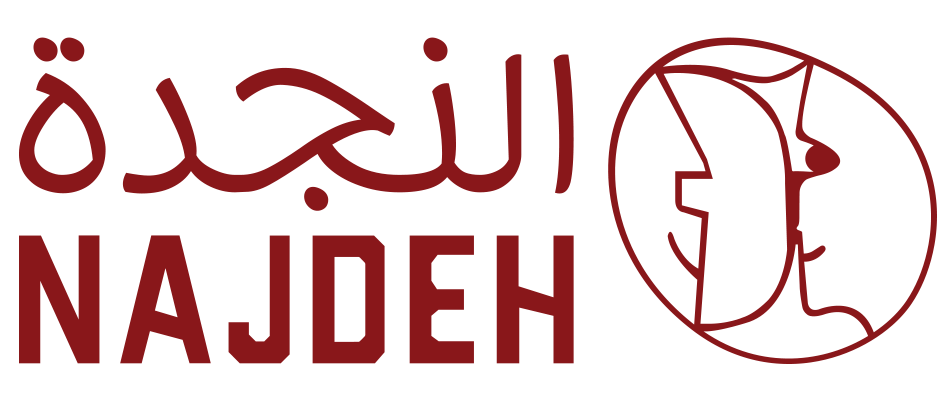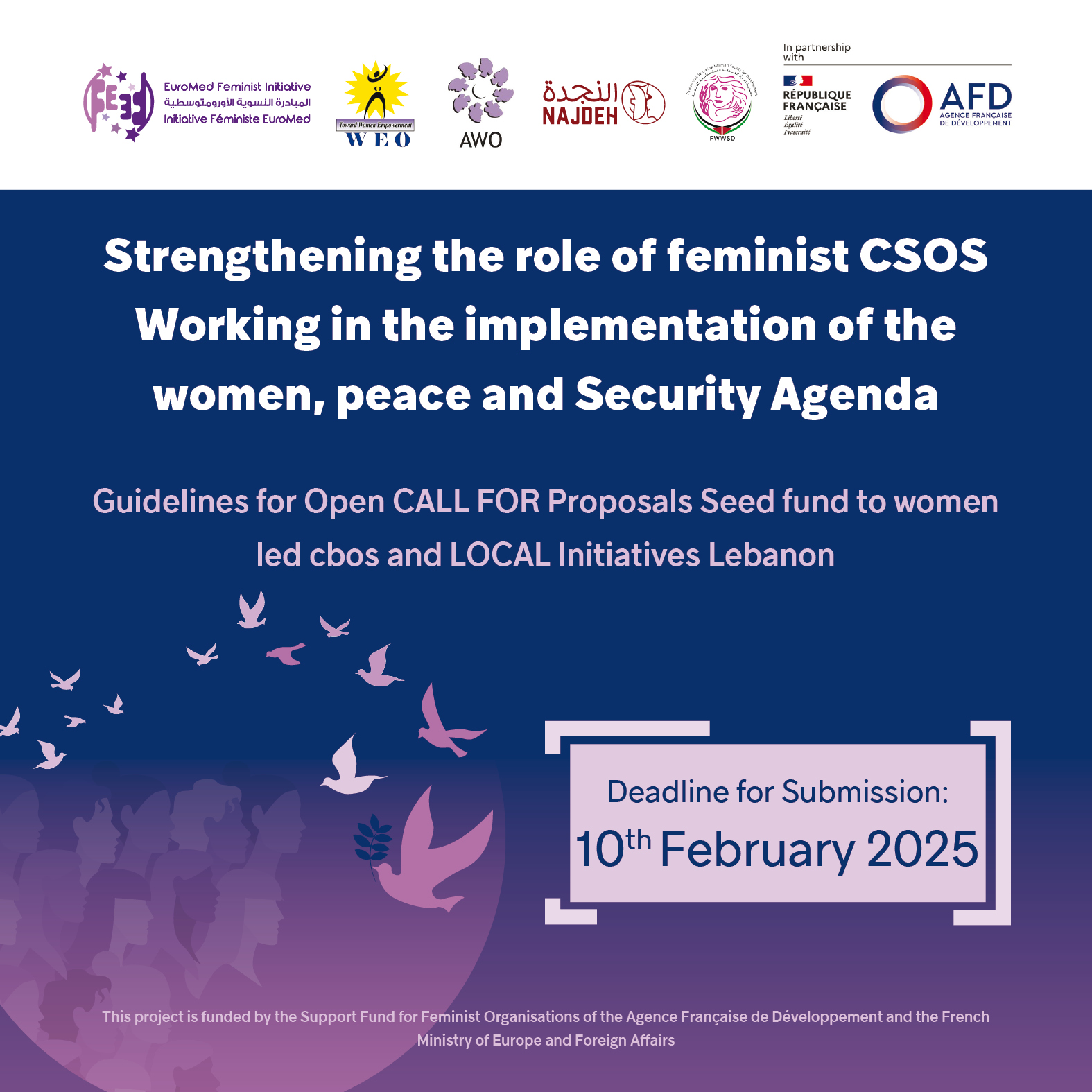
Category: Latest news


A Delegation from the Palestinian-Lebanese Dialogue Committee Visits Association Najdeh in Dbayeh Camp
in Latest news
Dbayeh, Association Najdeh received a delegation from the Palestinian-Lebanese Dialogue Committee and the United Nations Relief and Works Agency for Palestine Refugees in the Near East (UNRWA). The delegation included Ms. Nadine Marouk, Technical Coordination Advisor at the Palestinian-Lebanese Dialogue Committee, and Ms. Tamara Batarseh, Director of the Camp Services Office, along with their accompanying delegation.
The delegation was welcomed by Mr. Saeed Diab, Branch Coordinator of Association Najdeh, along with project and programme managers and the association’s team. The visit aimed to strengthen partnership, cooperation, and coordination in initiatives to enhance community resilience. The discussions covered the various economic, social, and health conditions affecting the region.
Interventions were made regarding the situation of Palestinian refugees in the camp. The visit concluded with a discussion on the work of the Palestinian-Lebanese Dialogue Committee team across different tracks.

The graduation ceremony of the children of the third kindergarten for the year 2023 – 2024 – our future builders
in Latest news
The pre-school education project at Association Najdeh concluded its academic year with the graduation ceremony of the children of the third kindergarten in all the kindergartens of the Najdeh Association, which are located in 6 Palestinian refugee camps in Lebanon in Shatila, Ain El-Helwa, Al-Bass, Burj El-Shamali, El-Badawi, and Naher El-Bard. The number of students graduated from the third kindergarten reached 151 students. The ceremony included many performances and dances in celebration on this occasion and handed over the graduation certificates to our dear children with the taking of memorial photos, as that a new stage in their lives, which is the school education stage, within the project to support early childhood education.
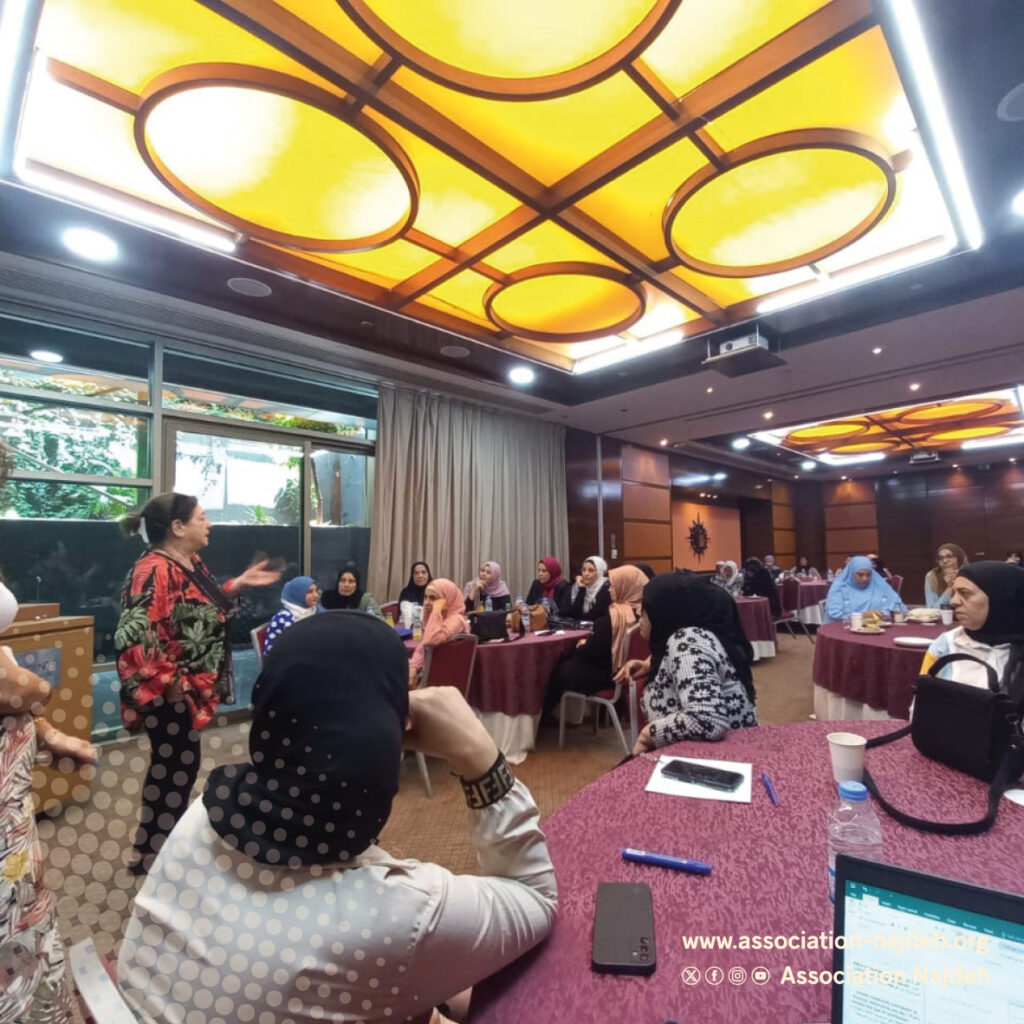
Training on the Methodology for Designing Community Resilience Initiatives
in Latest news
Beirut – within the framework of interactive capacity building, Association Najdeh and the Organisation of the Movement for Peace conducted a multi-phase training workshop over 5 days on the methodology for designing community resilience initiatives. The training included how to derive ideas from the real problems and community needs faced by women, mechanisms for planning, organising, implementation, and evaluation, and how to identify the needs of the local community. Participants were motivated by the importance of their role in the community, and the training included the development of several initiative plans through training groups. 200 participants from the local community took part in the training, which was facilitated by Ms. Fatima Shaheen and Ms. Amal Ghazlan. This was part of a project for humanitarian support and providing protection services for women and the families of Palestinian and Syrian refugees, as well as the host communities in the Shatila and Burj Al-Barajneh camps in Lebanon.
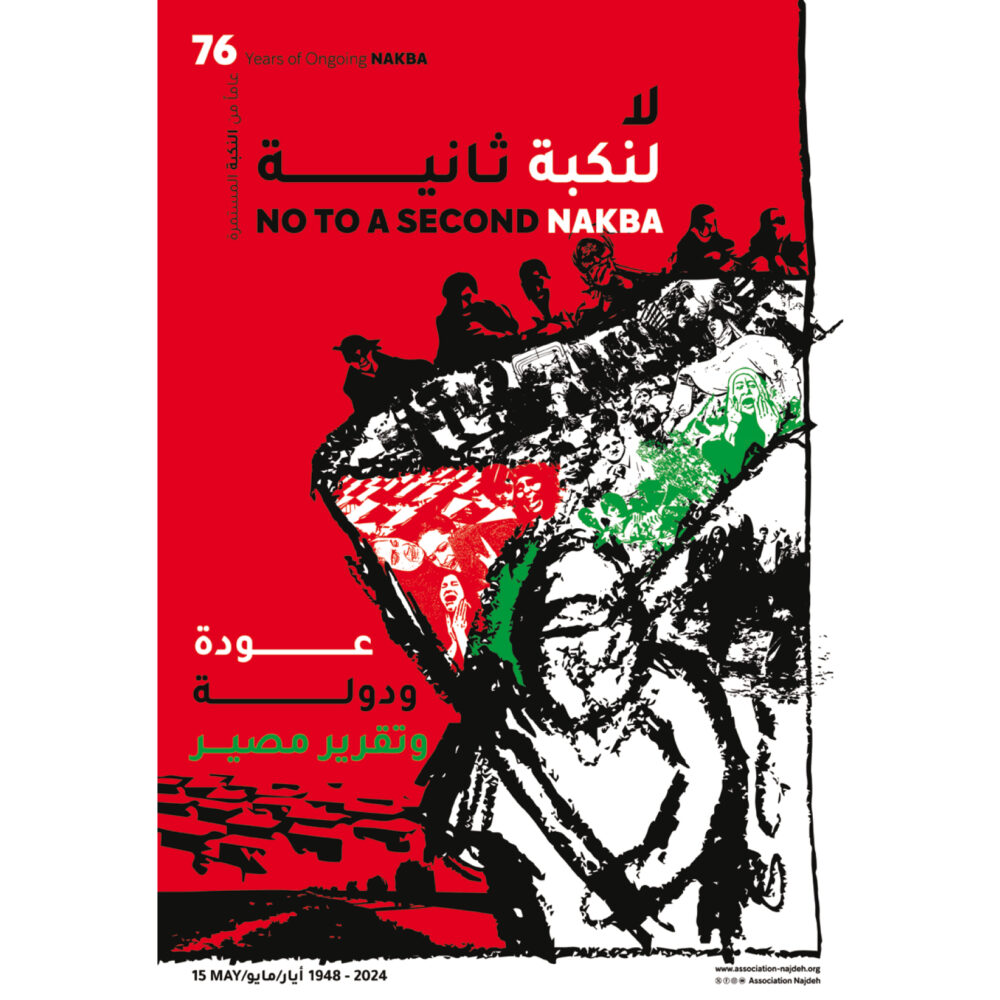
No Second Nakba
in Latest news
15/05/2024
On the 76th anniversary of the Nakba, Association Najdeh reaffirms the national rights to return, an independent state, and self-determination, declaring: no to a second Nakba.
This year’s commemoration of the Nakba comes as our Palestinian people are engaged in heroic resistance against the genocide being perpetrated in Gaza and are standing firm against the settler militias and the barbaric Israeli occupation in the West Bank and Jerusalem. In its aggression and genocidal war, supported by imperialist countries led by the United States, the Israeli occupation violates all international laws and treaties. It uses internationally banned means, targeting civilians, including children, women, and the elderly, as well as medical facilities, international staff, civil defence, and even UN and humanitarian centres.
The nearly eight months of genocide would not have continued with such brutality without the green light given by Western countries, the United Nations, and the official silence of some Arab states to the Israeli colonial, Nazi-like occupying army in Palestine.
On this occasion, Association Najdeh emphasises that this battle is not just Gaza’s battle; it is a battle for national rights against the Zionist project. It is a battle for the entire Palestinian people, who aspire to freedom and independence, and who will not cease their struggle until they secure their national rights to return, establish an independent state, and achieve self-determination. This includes the dismantling of the Israeli apartheid system in all its forms, including its settlements. It is a battle for the free world against oppression, tyranny, and colonialism, and for humanitarian justice for the people of Palestine and all oppressed peoples striving to end the genocidal war waged in Gaza, the West Bank, and Jerusalem.
On the 76th anniversary of the Nakba, Association Najdeh asserts that justice and human rights cannot be upheld globally until they are upheld for the people of Palestine. We call for the expansion of Arab and international popular movements and continued pressure on the US administration and Israel to stop the aggression, lift the siege on Gaza, end the genocide and ethnic cleansing perpetrated by the occupation against the Palestinian people, release all Palestinian prisoners in Israeli jails, and halt the killings, arrests, settlements, and invasions of West Bank cities and camps. We also call for efforts to prosecute Israel for the war crimes committed against the Palestinian people.
Association Najdeh extends its full greetings to our resilient people in Gaza, the West Bank, and Jerusalem. Long live our people’s struggle, Long live global solidarity against occupation and colonialism, Glory to our martyrs everywhere.
Social Aid Society
Beirut, 15 May 2024
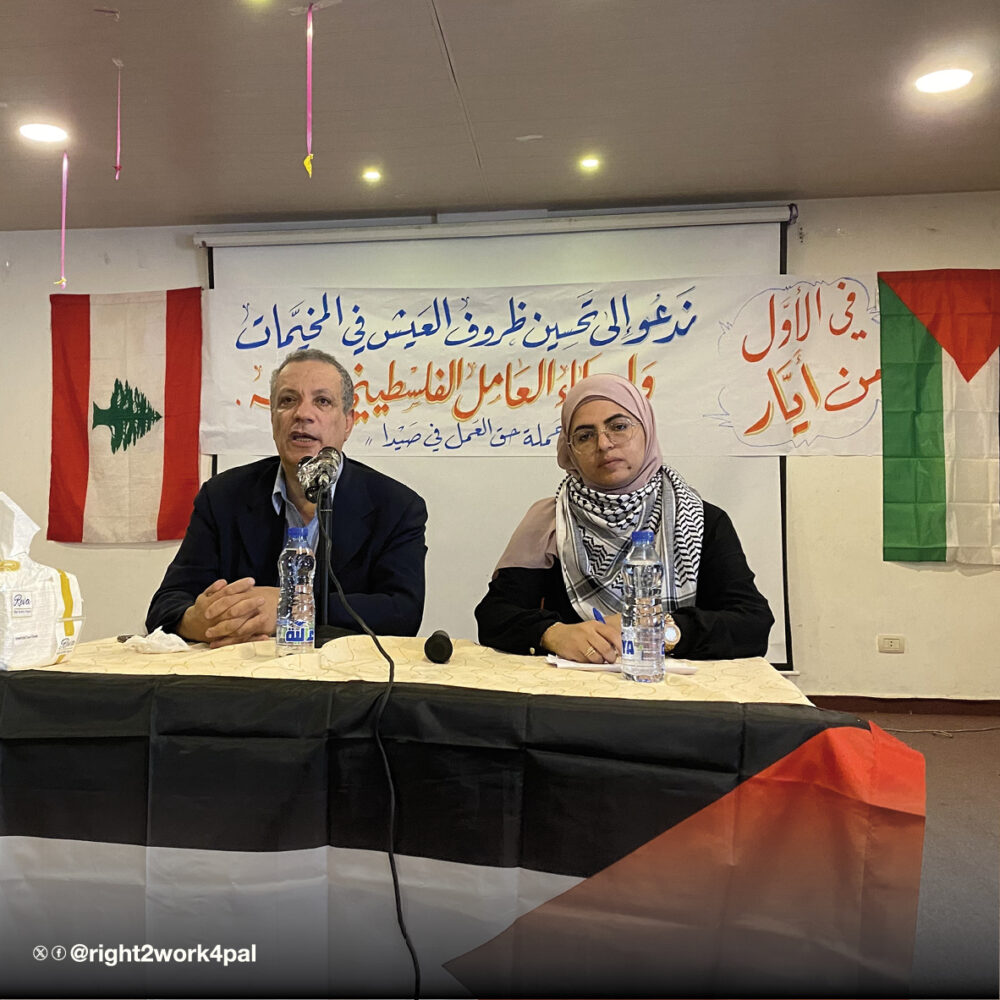
The Situation of Palestinian Refugees in Lebanon and the Impact of the Economic Crisis on Palestinian Labour in Ain al-Hilweh Camp
in Latest news
02/05/2024
Ain al-Hilweh: On the occasion of International Workers’ Day, the Lebanese-Palestinian Coalition for the Right to Work Campaign for Palestinian Refugees in Lebanon organised an interactive seminar and open discussion titled “The Situation of Palestinian Refugees in Lebanon and the Impact of the Economic Crisis on Palestinian Labour.” The event was attended by representatives of factions, political parties, national and Islamic forces, popular committees, NGOs, women’s committees, the Engineers’ Union, social associations, and activists from the local community, including workers.
After welcoming the attendees, Mrs. Jamal Kleib, Executive Director of the Social Solidarity Association, delivered the coalition’s statement for International Workers’ Day: “No economic and social justice without ending the genocide of Palestinian workers. Greetings and appreciation to workers around the world, especially to those in Palestine, Gaza, the West Bank, Jerusalem, and the occupied territories, who, like other members of the Palestinian people, endure systematic violations by the Israeli occupation: harassment at military checkpoints, targeting of labour and agricultural facilities, land confiscation, and suffering from genocide, starvation, and displacement in Gaza. Special recognition is given to the workers in Lebanon and Palestine who face harsh economic conditions and overcome difficulties to ensure a decent living for their families.” The discussion highlighted key issues affecting Palestinian labour.
Fathi Kleib, a researcher and journalist on Palestinian affairs, spoke about the severe crisis affecting Palestinian workers as part of a broader targeting of all refugee groups suffering from an economic war aimed directly at UNRWA. This crisis is exacerbated by the political and economic situation in Lebanon, with Palestinian refugees being the most affected due to their limited options. He noted that this pressure is likely to increase, citing the year-long cut in US funding for UNRWA as an example of such pressures that may take various forms in the future.
Kleib added that the economic warfare aimed at drying up UNRWA’s financial resources has failed, but the pressure continues. Increased economic pressure is expected on refugees in Lebanon, particularly workers, whether through heightened pressure on UNRWA or continued legal restrictions and harassment of Palestinians under questionable pretexts. He cited the actions of Minister Camille Abu Suleiman and the resistance from racist factions against improvements sought by Minister Mustafa Bayram for Palestinian labour conditions as examples.
Kleib concluded by stating that Palestinian workers and refugees in Lebanon only demand the basic human right of legal recognition through legislation that protects them, enabling them to work freely without legal persecution. He emphasised that Palestinian workers do not compete with Lebanese workers and are, in fact, a vital part of the Lebanese economy. The legal pressures and closure of the Lebanese job market to Palestinian workers have led to widespread economic collapse, as reflected in UNRWA’s data showing extremely high poverty rates among refugees in Lebanon.
He stressed that addressing the difficult economic and social conditions faced by Palestinian workers requires cooperation from international, Lebanese, and Palestinian authorities to develop solutions that the refugees can no longer endure alone. Palestinian official and popular bodies, including the Authority, the Organisation, and the factions, must develop joint policies to mitigate the crisis, provide minimum living requirements, and mobilise a unified popular movement to press UNRWA and donor countries to adopt policies and measures in line with the Lebanese situation.
The seminar included valuable contributions from the attendees, and at the end of the event, several workers were honoured for their efforts and dedication in supporting development in their workplaces.
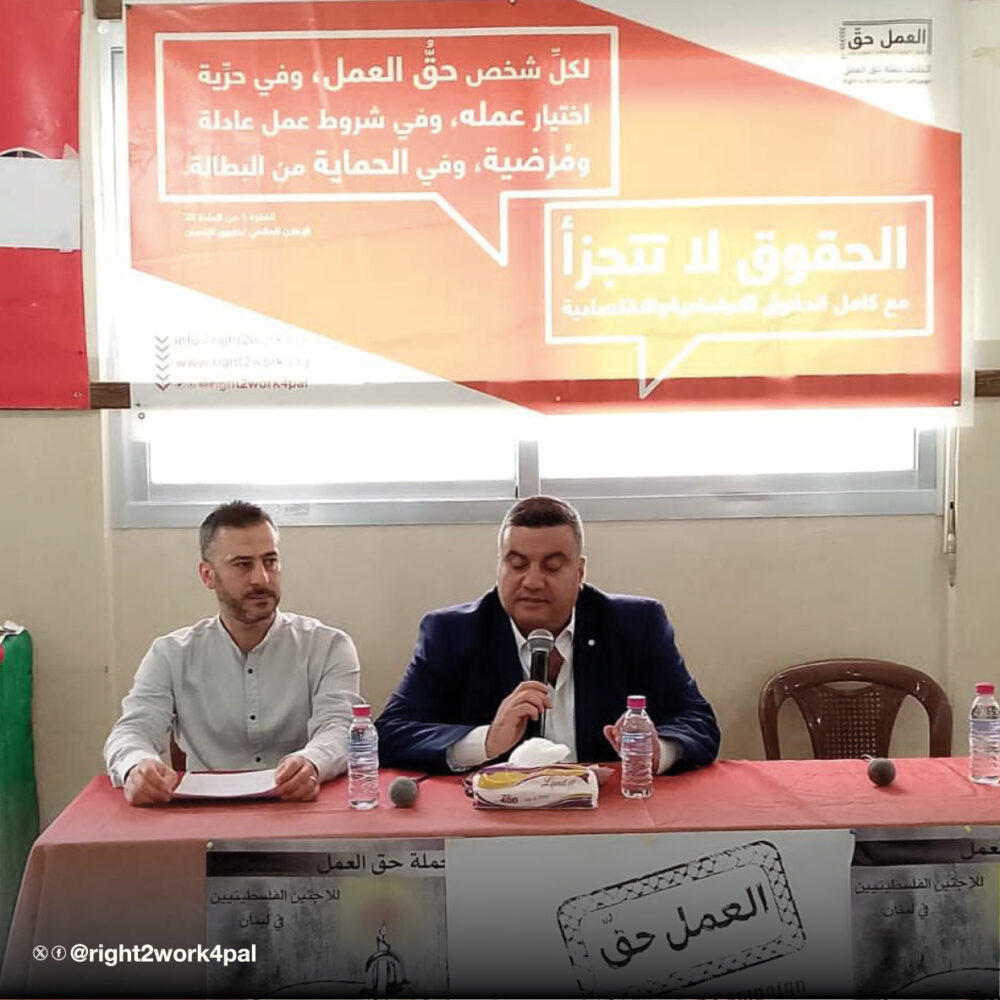
The Situation of Palestinian Refugees in Lebanon and the Impact of the Economic Crisis on Palestinian Labour in Nahr al-Bared Camp
in Latest news
02/05/2024
Nahr al-Bared: On the occasion of International Workers’ Day, the Lebanese-Palestinian Coalition for the Right to Work Campaign for Palestinian Refugees in Lebanon organised an interactive seminar and open discussion titled “The Situation of Palestinian Refugees in Lebanon and the Impact of the Economic Crisis on Palestinian Labour.” The event was attended by representatives of factions, political parties, national and Islamic forces, popular committees, NGOs, women’s committees, the Engineers’ Union, social associations, and activists from the local community, including workers.
After welcoming the attendees, Mr. Alaa Dirawi, the coalition coordinator in Tripoli, delivered the coalition’s statement for International Workers’ Day: “No Economic and Social Justice Without Ending the Genocide of Palestinian Workers. Greetings and appreciation to workers worldwide, especially to those in Palestine, Gaza, the West Bank, Jerusalem, and the occupied territories, who, like other members of the Palestinian people, endure systematic violations by the Israeli occupation: harassment at military checkpoints, targeting of labour and agricultural facilities, land confiscation, and suffering from genocide, starvation, and displacement in Gaza. Special recognition is given to the workers in Lebanon and Palestine who face harsh economic conditions and overcome difficulties to ensure a decent living for their families.” The discussion highlighted key issues affecting Palestinian labour.
Captain Shadi Al-Sayed, President of the Federation of Workers and Employees Unions in the North, spoke about the importance of Lebanese-Palestinian relations in various fields, particularly concerning Palestinian workers and their rights, which are denied by Lebanese law. He emphasised the need for solidarity and joint efforts to secure the rights of Palestinian workers and offered his support to any Palestinian worker seeking to claim their rights through the Labour Arbitration Council.
The seminar included valuable contributions from the attendees, and at the end of the event, several workers were honoured for their efforts and dedication in supporting development in their workplaces.
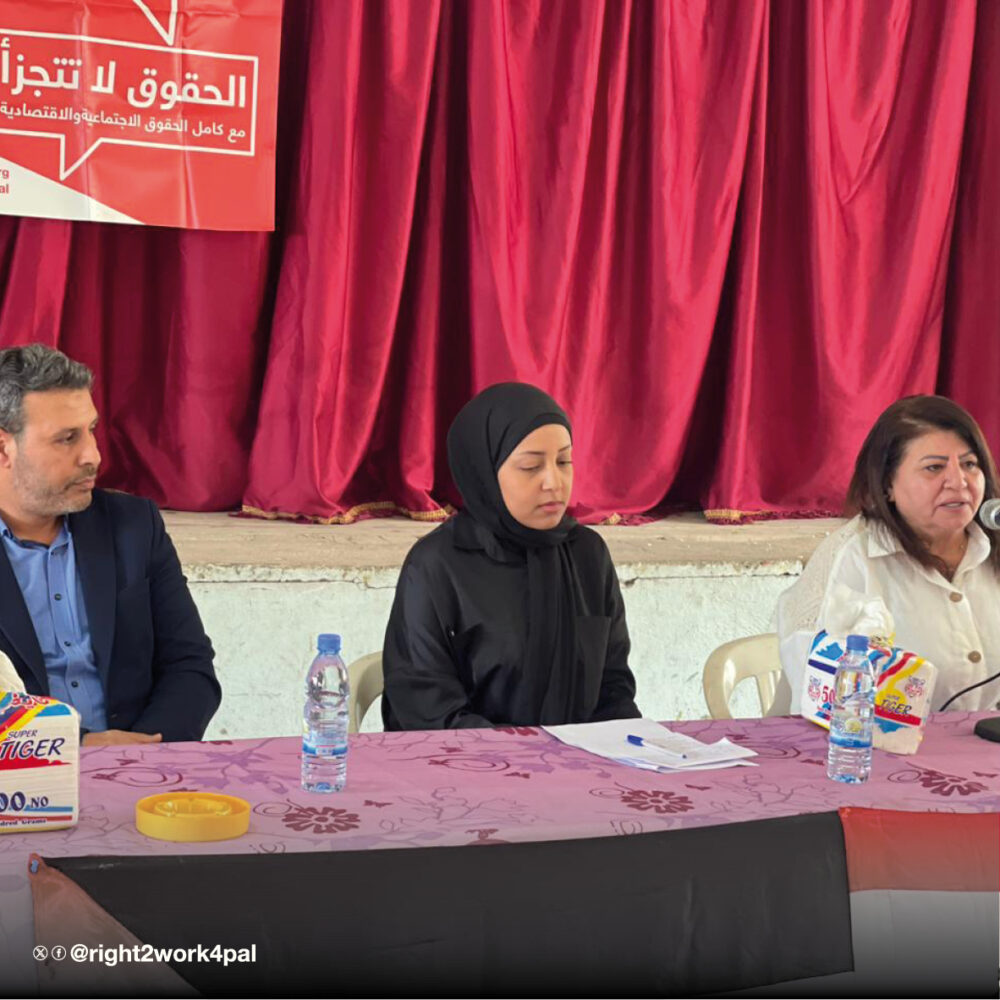
The Situation of Palestinian Refugees in Lebanon and the Impact of the Economic Crisis on Palestinian Labour in Burj Al-Shamali Camp
in Latest news
02/05/2024
Burj Al-Shamali: On the occasion of International Workers’ Day, the Lebanese-Palestinian Coalition for the Right to Work Campaign for Palestinian Refugees in Lebanon organised an interactive seminar and open discussion titled “The Situation of Palestinian Refugees in Lebanon and the Impact of the Economic Crisis on Palestinian Labour.” The event was attended by representatives of factions, popular committees, NGOs, women’s committees, and activists from the local community.
After welcoming the attendees, Ms. Aya Mustafa, the coalition coordinator in Tyre, read the coalition’s statement for International Workers’ Day: “No Economic and Social Justice Without Ending the Genocide of Palestinian Workers. Greetings and appreciation to workers worldwide, especially to those in Palestine, Gaza, the West Bank, Jerusalem, and the occupied territories, who, like other members of the Palestinian people, endure systematic violations by the Israeli occupation: harassment at military checkpoints, targeting of labour and agricultural facilities, land confiscation, and suffering from genocide, starvation, and displacement in Gaza. Special recognition is given to the workers in Lebanon and Palestine who face harsh economic conditions and overcome difficulties to ensure a decent living for their families.” The discussion highlighted key issues affecting Palestinian labour.
Mr. Wissam Tufla, the head of unions in the first district of Jabal Amel, expressed his greetings to all Arab workers and endorsed the coalition’s statement, emphasising the need to amend and implement laws concerning Palestinian refugees. He also stressed the importance of creating youth projects to reduce unemployment.
Ms. Zahra Mohammed, responsible for working women in the Union of Palestinian Workers’ Unions, spoke about the hardships faced by both Lebanese and Palestinian people under difficult circumstances, noting that the situation is particularly harsh for Palestinians who are deprived of the right to work in certain professions due to discriminatory laws. She called on the Lebanese government to amend these laws.
The seminar included valuable contributions from the attendees, and at the end of the event, several workers were honoured for their efforts and dedication in supporting development in their workplaces.
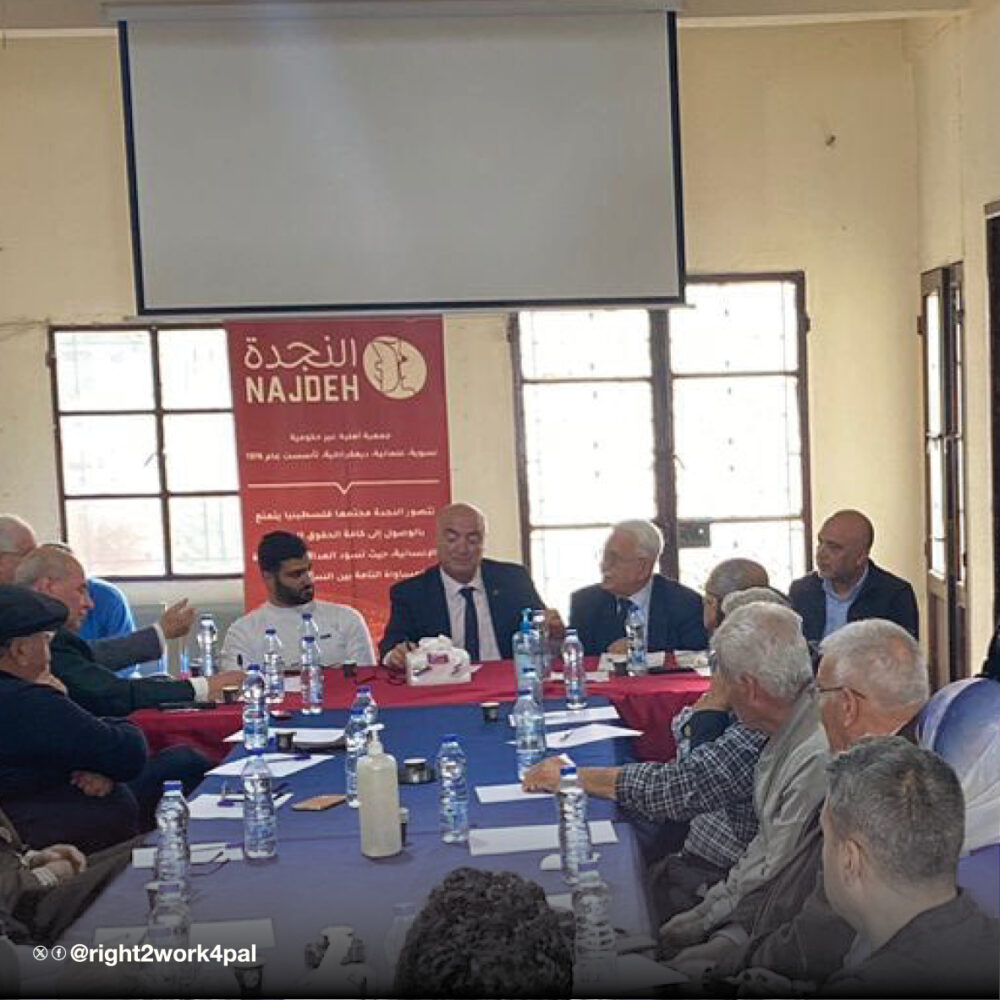
The Situation of Palestinian Refugees in Lebanon and the Impact of the Economic Crisis on Palestinian Labour in Saadnayel
in Latest news
01/05/2025
Saadnayel: On the occasion of International Workers’ Day, the Lebanese-Palestinian Coalition for the Right to Work Campaign for Palestinian Refugees in Lebanon organised an interactive seminar and open discussion titled “The Situation of Palestinian Refugees in Lebanon and the Impact of the Economic Crisis on Palestinian Labour.” The event was attended by representatives of Lebanese national and Islamic parties and forces, factions and popular committees, Mr. Mohamed Khaled, a member of the Palestinian National Council, Mr. Yasser Al-Hajj, UNRWA director in Beqaa, along with institutions, NGOs, women’s committees, local community activists, and workers.
Mr Omar Ali, the coalition coordinator in Beqaa, welcomed the attendees and read the coalition’s statement for International Workers’ Day: “No Economic and Social Justice Without Ending the Genocide of Palestinian Workers. Greetings and appreciation to workers worldwide, especially to those in Palestine, Gaza, the West Bank, Jerusalem, and the occupied territories, who, like other members of the Palestinian people, endure systematic violations by the Israeli occupation: harassment at military checkpoints, targeting of labour and agricultural facilities, land confiscation, and suffering from genocide, starvation, and displacement in Gaza. Special recognition is given to the workers in Lebanon and Palestine who face harsh economic conditions and overcome difficulties to ensure a decent living for their families.” The discussion highlighted key issues affecting Palestinian labour.
Lawyer Suhail Natour, a researcher, political thinker, and member of the Lebanese-Palestinian Dialogue Committee, spoke about the crisis facing Palestinian workers as part of a broader targeting of all refugee groups. He noted that Palestinian refugees are particularly affected by the comprehensive economic war against them, which includes direct targeting of UNRWA. He highlighted that Palestinian refugees in Lebanon are among the most affected due to limited options and predicted that this pressure will increase. He cited the example of the US cutting funding to UNRWA for a year as one form of this pressure, which might take various forms in the future.
Natour further explained that the economic war targeting UNRWA and drying up its financial resources has failed, despite ongoing efforts. He expects increased economic pressure on refugees in Lebanon, particularly workers, through heightened pressure on UNRWA or legal restrictions and persecutions, as seen with Minister Camille Abou Sleiman and the rejection of improvements for Palestinian workers attempted by Minister Mustafa Bayram.
Natoor continued, stating that Palestinian workers and refugees in Lebanon are only demanding their basic human right to legal recognition through legislation that provides protection, allowing them to work freely without legal persecution. He emphasised that Palestinian workers do not compete with Lebanese workers and are an important part of the Lebanese economy. Legal pressure and closing the Lebanese job market to Palestinian workers have led to an economic collapse, reflected in UNRWA’s data showing very high poverty rates among refugees in Lebanon.
Dr Fawaz Farhat, head of the Popular Intellectual Current Association, stressed that addressing the difficult economic and social conditions faced by Palestinian workers requires cooperation from international, Lebanese, and Palestinian authorities to find solutions. He called for providing minimum living standards and mobilising a unified popular movement to pressure UNRWA and donor countries to adopt policies and measures that address the Lebanese crisis.
In conclusion, a discussion and exchange of ideas took place on the obstacles and appropriate methods to ensure that Palestinian refugees receive their human rights.
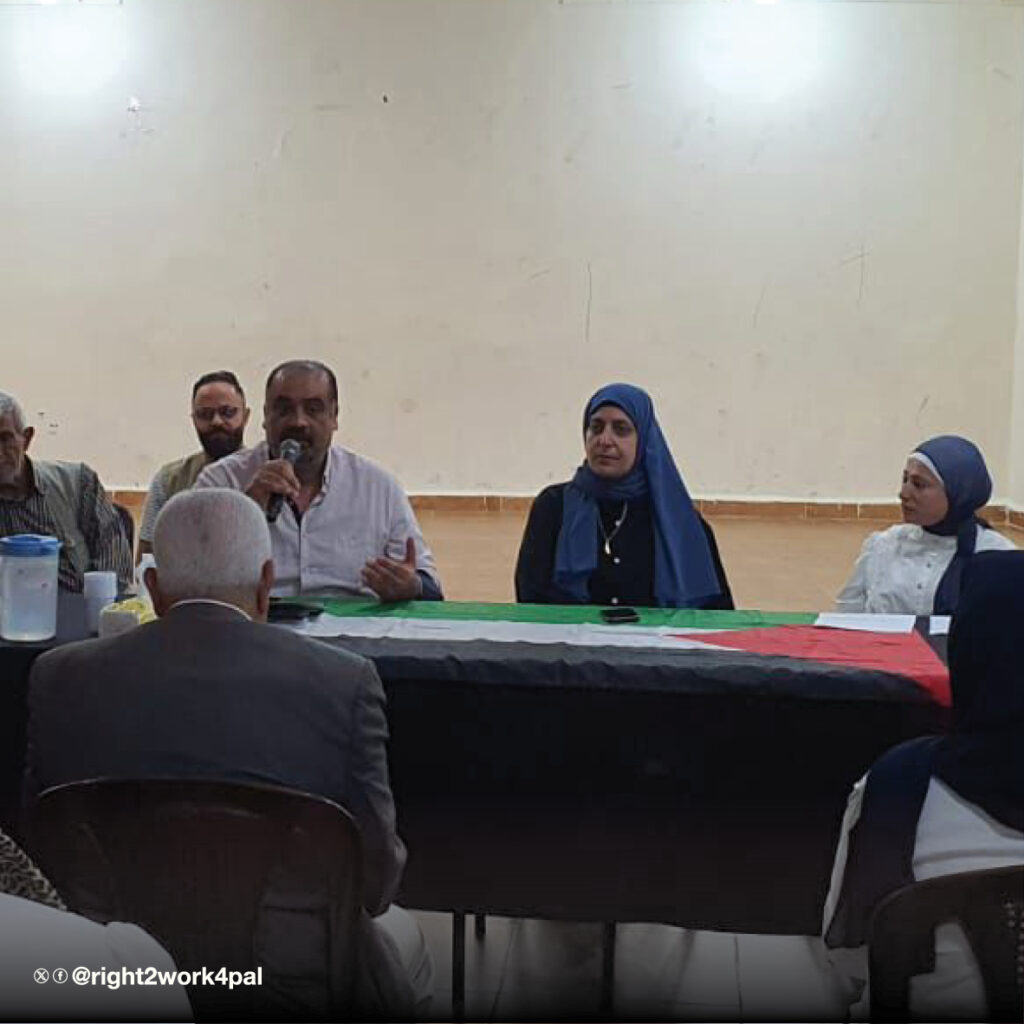
The Situation of Palestinian Refugees in Lebanon and the Impact of the Economic Crisis on Palestinian Labour in Beddawi Camp
in Latest news
01/05/2024
Beddawi: On the occasion of International Workers’ Day, the Lebanese-Palestinian Coalition for the Right to Work Campaign for Palestinian Refugees in Lebanon organised an interactive seminar and open discussion titled “The Situation of Palestinian Refugees in Lebanon and the Impact of the Economic Crisis on Palestinian Labour.” The event was attended by representatives of factions and popular committees, institutions and NGOs, women’s committees, local community activists, and scout clubs.
After welcoming the attendees, Ms Hanaa Al-Ainain, Coordinator of the Beddawi branch of Association Najdeh, read out the Coalition’s statement for International Workers’ Day: “No Economic and Social Justice Without Ending the Genocide of Palestinian Workers. Greetings and appreciation to workers worldwide, especially to the workers in Palestine, Gaza, the West Bank, Jerusalem, and the occupied territories. These workers, like other members of the Palestinian people, endure systematic violations by the Israeli occupation, including abuse at military checkpoints, targeting of labour and agricultural facilities, land confiscation, and suffering from genocide, starvation, and displacement in Gaza. Special recognition is given to the workers in Lebanon and Palestine who face harsh economic conditions and overcome difficulties to ensure a decent living for their families.” The key points affecting Palestinian labour were highlighted during the discussion.
Mr Ahmed Dawood, Executive Director of the Community Rehabilitation Association, spoke about advocating for workers’ rights: reasonable working hours, fair wages or daily rates, logical job requirements, respect for dignity, and appreciation. He also discussed raising awareness about transforming individual capital into collective capital, the economic crisis, the situation of Palestinian workers in Lebanon, and the inconsistent treatment of Palestinians under Lebanese laws—as refugees, foreigners, or residents. He addressed the rights-based approach and the role of Palestinians in the economy.
Ms Rola Ghamrawi, Executive Director of the Rabat Development Association, discussed Lebanese labour laws and their approach to work permits. She addressed the decision banning foreigners from practising about 75 professions and the possibility of exempting some foreigners from this decision, which has not improved the employment conditions for Palestinian refugees. She also talked about professions that could be restrictive for Palestinians and present challenges in finding job opportunities: specialised professions, technical and creative professions, scientific and research professions, and high-risk jobs.
The seminar included several valuable contributions from the attendees. At the end of the meeting, a number of workers were honoured on the occasion of International Workers’ Day in recognition of their efforts and dedication to their roles in supporting the development journey at their workplaces.
